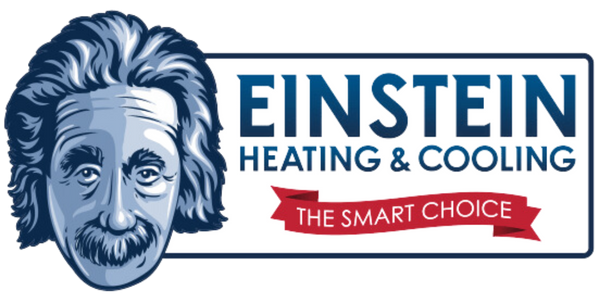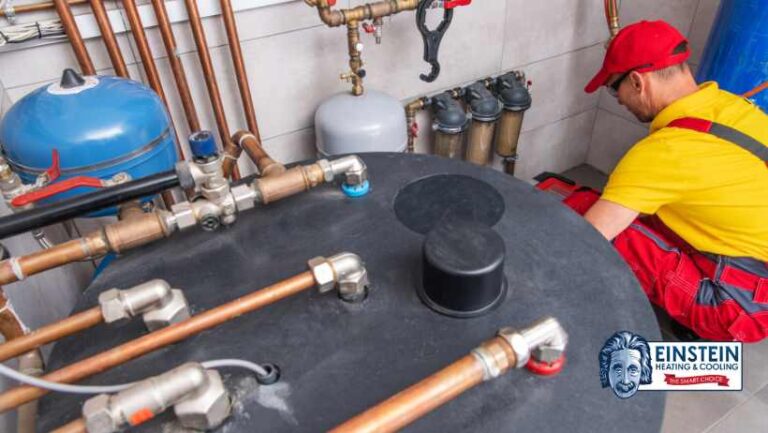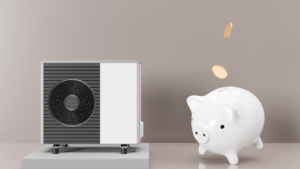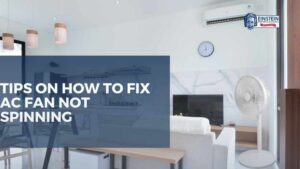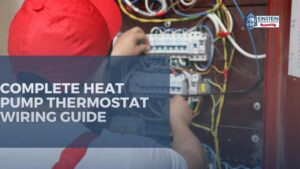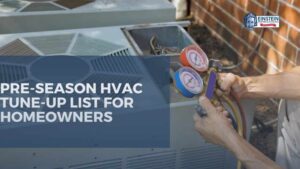Heating system service is essential for maintaining indoor comfort and warmth, especially during the cold winter months. Proper maintenance and occasional repair are crucial to ensure your home or office heating systems in Madras, Oregon operate efficiently and effectively. Einstein Heating and Cooling is your trusted partner in providing top-notch heating system service. Before we discuss the essential steps of checking the state of your heating system, we will outline the key factors affecting the heating system service in Madras, Oregon.
1. Factors Influencing Heating System Service
1.1 System Type
The type of heating system you have plays a critical role in determining the service requirements. Different systems, such as furnaces, boilers, and heat pumps, have unique needs:
- Furnaces: Furnaces typically require more frequent filter changes and combustion chamber cleaning. Annual inspections are common.
- Boilers: Boiler servicing may involve checking for leaks and ensuring the pressure is optimal. Additionally, regular cleaning of the heat exchanger is essential.
- Heat Pumps: These systems often require regular filter cleaning and maintenance of the outdoor unit, which includes clearing debris from the coils.
- Radiant Heating: Radiant heating systems may involve checking for leaks in the radiant tubing and assessing the condition of the boiler or water heater for repair.
1.2 System Age
The age of your heating system is a crucial determinant of service needs:
- New Systems: Newly installed heating systems from a reputable heating installation service in Madras generally require less frequent servicing. However, they should still receive an annual inspection to ensure everything is functioning as it should.
- Middle-Aged Systems: Systems that are between 5 to 15 years old may require more in-depth servicing, including cleaning and some component replacement.
- Older Systems: Systems that are more than 15 years old often need frequent service and may require component replacements or even system upgrades for efficiency and safety.
1.3 Frequency of Use
The frequency with which you use your heating system affects service requirements:
- Seasonal Use: Systems that are used only during certain seasons, such as winter, may require service at the beginning of each season to ensure they are in good working order.
- Year-Round Use: For systems used throughout the year, more frequent service may be necessary. This includes checking components like the cooling coils in heat pumps.
1.4 Environmental Conditions
Environmental factors can have a significant impact on the service needs of your heating system:
- Extreme Temperatures: Systems in regions with extreme temperatures (very hot or very cold) may experience more strain and require more frequent service.
- Humidity: High humidity levels can lead to rust and corrosion, making regular inspections and maintenance even more critical.
1.5 Manufacturer Recommendations
Manufacturers provide specific guidelines for servicing their heating systems, which should be followed closely:
- Service Intervals: Manufacturers typically specify how often the system should be serviced. Failure to adhere to these recommendations may void warranties.
- Recommended Procedures: Manufacturer guidelines also include the specific procedures that should be followed during servicing. This ensures that the system is maintained correctly.
1.6 Regular Maintenance
Regular maintenance is the cornerstone of a dependable heating system. This factor encompasses various tasks and checks to ensure your system runs smoothly throughout the year:
- Filter Replacement: Regularly changing air filters is essential for maintaining indoor air quality and the efficiency of your heating system. Dirty filters restrict airflow and can lead to reduced performance.
- Inspection of Components: A thorough inspection of all system components, including the furnace, heat exchanger, burners, and thermostat, is necessary to identify and address any issues promptly.
- Cleaning: Dust and debris can accumulate over time, hindering the system’s efficiency. A thorough cleaning of components and air ducts is essential for optimal performance.
- Lubrication: Moving parts, such as fans and motors, require proper lubrication to prevent friction and wear. Well-lubricated parts work more efficiently and last longer.
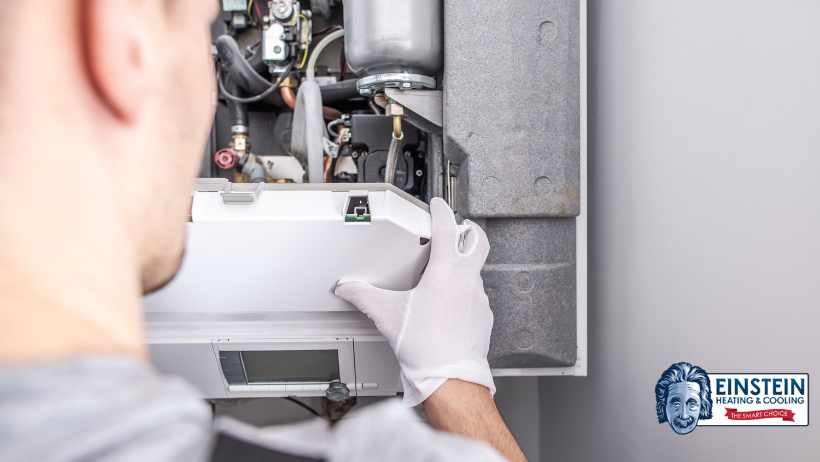
1.7 Energy Efficiency
Optimizing your heating system for energy efficiency is not only environmentally responsible but also cost-effective. Here are the factors to consider:
- Up-to-Date Equipment: Older heating systems tend to be less energy-efficient. Upgrading to a modern, high-efficiency system can result in substantial energy savings.
- Thermostat Upgrades: Installing a programmable or smart thermostat allows you to set temperatures based on your schedule, reducing unnecessary energy consumption.
- Zoning: Zoning your heating system enables you to heat only the areas that are in use, avoiding wasted energy in unoccupied spaces.
- Insulation and Sealing: Proper insulation and sealing of your home or building can significantly reduce heat loss, reducing the load on your heating system.
- Regular Tune-ups: Annual professional tune-ups can ensure that your system is running efficiently. Small issues can be addressed before they become major problems, saving you money in the long run.
1.8 Repairs and Parts Replacement
Even with regular maintenance, heating systems can develop issues over time. When repairs are needed, timely action is essential:
- Prompt Repairs: Addressing heating system issues as soon as they are detected can prevent them from worsening and becoming more costly to repair.
- OEM Parts: When replacement parts are required, using Original Equipment Manufacturer (OEM) parts ensures compatibility and optimal performance.
- Professional Technicians: Skilled technicians in Madras, Oregon with experience in handling your specific heating system make all the difference in ensuring quality repairs.
- Emergency Services: In cases of sudden breakdowns or malfunctions, having access to 24/7 emergency repair services is invaluable for restoring heating when you need it most.
1.9 Indoor Air Quality
Heating system service is not just about warmth but also about the quality of the air you breathe. Key considerations include:
- Air Filtration: High-quality air filters not only protect your heating system but also improve indoor air quality by removing dust, allergens, and pollutants.
- Humidification: Maintaining the right humidity levels in your home or building is essential for comfort and health. Dry air can lead to respiratory problems and discomfort.
- Air Duct Cleaning: Over time, air ducts can accumulate dust and contaminants, which can impact indoor air quality. Regular cleaning ensures clean and healthy air circulation.
- Ventilation: Proper ventilation and air exchange are essential for maintaining a fresh and healthy indoor environment. Properly maintained heating systems facilitate this.
1.10 Environmental Considerations
In today’s world, environmental responsibility is crucial. Reducing your carbon footprint and energy consumption are not only ethical but often come with cost savings:
- Energy-Efficient Systems: Upgrading to energy-efficient heating systems not only saves you money but also reduces your carbon footprint.
- Proper Disposal: When it’s time to replace your heating system, proper disposal of the old system is important to avoid environmental harm.
- Sustainable Heating Solutions: Consider alternative heating solutions like geothermal or solar heating, which are eco-friendly and energy-efficient.
1.11 Maintenance Plans
To ensure consistent and effective heating system service, consider enrolling in a maintenance plan with Einstein Heating and Cooling. These plans typically offer benefits such as:
- Scheduled Maintenance: Service providers will schedule regular maintenance visits, ensuring that your heating system is always in top condition.
- Discounted Repairs: Maintenance plan subscribers often receive discounts on repair services, reducing the cost of unexpected repairs.
- Priority Service: In case of a breakdown, maintenance plan subscribers are often given priority, ensuring faster response times.
- Peace of Mind: Knowing that your heating system is in expert hands and well-maintained provides peace of mind and ensures uninterrupted comfort.
2. Steps in Heating System Service
2.1 Inspection
2.1.1 Visual Examination
Visual inspections serve as the initial step in the heating system service process, allowing for a quick assessment of the system’s condition:
- Safety Check: The first priority is ensuring that the system is securely fastened and free from immediate hazards. Visual inspection detects loose connections, exposed wiring, or other potential dangers.
- Component Inspection: Key components, such as the heat exchanger, burners, blower, and fuel lines, undergo a close examination. Any visible damage, signs of wear, or corrosion are carefully noted.
- Flue and Vent Inspection: A thorough inspection of the flue and vent system is conducted to check for blockages, damage, or signs of wear. Proper venting is crucial for the safe and efficient operation of the heating system.
2.1.2 Combustion Analysis
For systems that burn fuel, such as natural gas, oil, or propane, combustion analysis is an essential part of service:
- Air-to-Fuel Ratio: Combustion analysis evaluates the air-to-fuel ratio, ensuring that it is optimal for efficient and clean burning. Adjustments may be made to reduce emissions and enhance efficiency.
2.2 Cleaning
2.2.1 Dust and Debris Removal
Cleaning is a fundamental aspect of heating system service, and it includes various critical tasks:
- Burner Cleaning: Cleaning the burners removes any carbon buildup, which can affect combustion efficiency and safety. Clean burners are essential for optimal performance.
- Blower Cleaning: The blower, responsible for circulating warm air, should be cleaned to ensure proper airflow and heat distribution. A clean blower is integral to maintaining system efficiency.
- Heat Exchanger Cleaning: A clean heat exchanger is crucial for efficient heat transfer. The removal of dirt or soot buildup ensures that heat is transferred effectively, maintaining system efficiency.
2.2.2 Air Duct Cleaning
Ductwork and air vents are essential components of heating systems. Dirty or clogged ducts can reduce airflow and indoor air quality. Cleaning the ducts and vents is vital to maintain optimal system operation:
- Preventing Obstructions: Clean ducts and vents prevent obstructions that can restrict airflow, leading to uneven heating and reduced energy efficiency.
- Enhancing Indoor Air Quality: Clearing out dust and debris from the ducts and vents ensures better indoor air quality by preventing the circulation of pollutants throughout your living or working space.
2.3 Lubrication
2.2.1 Lubrication of Moving Parts
Regular lubrication is necessary to reduce friction and extend the lifespan of moving parts within the heating system. Key areas that require lubrication include:
- Blower Motor Bearings: Proper lubrication of these bearings reduces wear and noise, allowing the blower to operate quietly and efficiently.
- Fan Blades: Lubricating the fan blades enhances their performance, reducing friction and prolonging their lifespan.
- Other Moving Parts: Any other moving parts, such as motors and pumps, should be lubricated as per manufacturer recommendations to ensure they function smoothly and quietly.
2.4 Calibration
2.4.1 Thermostat Calibration
Calibrating the thermostat is essential for maintaining a comfortable indoor environment. Accurate calibration ensures that it measures and controls the temperature effectively:
- Temperature Accuracy: Calibration verifies that the thermostat accurately measures the indoor temperature, preventing temperature fluctuations and maintaining energy efficiency.
- Comfort Optimization: Calibrating the thermostat ensures that your heating system provides consistent and reliable comfort, adapting to your preferences and requirements.
2.5 Testing
2.5.1 Performance Testing
Evaluating the performance of your heating system is a critical aspect of service:
- Heating Output: The measurement of heating output determines whether it matches your desired level of comfort. Adjustments may be made to ensure that the system meets your heating needs.
- Efficiency Testing: Assessing the efficiency of the system involves evaluating its energy consumption and heat production. This data helps identify areas for improvement and efficiency gains.
- Temperature Distribution: Testing ensures that the system provides even heating throughout your living or working space. This is vital for consistent comfort and energy efficiency.
2.5.2 Safety Testing
Safety considerations are paramount in heating system service:
- Carbon Monoxide Detection: The use of carbon monoxide detectors is essential to check for any leaks. Addressing any issues immediately is crucial to prevent dangerous carbon monoxide exposure.
- Fire Safety: The verification of safety features, such as flame sensors, is critical in preventing fire hazards. Functional safety features are essential for a secure heating system.
2.6 Filter Replacement
2.6.1 Air Filter Replacement
Air filters require replacement at regular intervals:
- Filter Type: Ensure that you use the correct type of filter recommended for your heating system. Using the wrong type can result in reduced efficiency and indoor air quality.
- Replacement Frequency: Understand how often filters should be replaced to maintain air quality and system efficiency. Frequency varies depending on factors such as filter type, usage, and the manufacturer’s recommendations.
2.7 System Efficiency Improvement
2.7.1 Insulation and Sealing
Efficiency improvements are integral to the heating system service process:
- Insulation: Checking the insulation of your living or working space is crucial to prevent heat loss. Proper insulation helps maintain a consistent indoor temperature, reducing energy waste.
- Duct Sealing: Sealing gaps and leaks in the ductwork is essential to prevent heated air from escaping and cold air from entering. Properly sealed ducts improve system efficiency and energy savings.
2.7.2 Energy-Efficient Upgrades
Incorporating energy-efficient upgrades is a significant part of enhancing the efficiency of your heating system:
- Programmable Thermostats: Installing programmable thermostats allows you to control temperature based on your schedule, reducing energy consumption during periods when heating is not needed.
- High-Efficiency Components: Consider upgrading to high-efficiency components, such as a variable-speed blower or a condensing furnace. These upgrades reduce energy costs and enhance system performance.
- Zoning Systems: Zoning systems enable you to heat only the areas that are in use, reducing energy waste and promoting efficient heating.
2.8 Documentation
2.8.1 Service Records
Maintaining comprehensive service records is essential for tracking the history of your heating system:
- Dates and Details: Record the dates of each service and the specific tasks performed during that service. This historical record allows for easy tracking and comparison.
- Warranty Compliance: Service records are critical for ensuring that your heating system’s warranty remains valid. Many manufacturers require proof of regular service for warranty claims.
- Future Planning: Service records can assist in planning for future maintenance and component replacements. If you need full replacement of a heating system, you may need to do a prompt heating installation in Madras by HVAC professionals. They provide a clear history of the system’s performance and maintenance needs.
Conclusion
Heating system service is a crucial aspect of maintaining a comfortable and efficient indoor environment. Regular maintenance, energy efficiency, safety checks, repairs, and environmental responsibility are all factors that play a role in the performance and longevity of your heating system. By considering these factors and enlisting the services of a professional provider like Einstein Heating and Cooling, you can enjoy reliable heating while saving on energy costs and contributing to a greener future. Don’t underestimate the importance of a well-maintained heating system – it’s not just about staying warm; it’s about staying smart and responsible.
